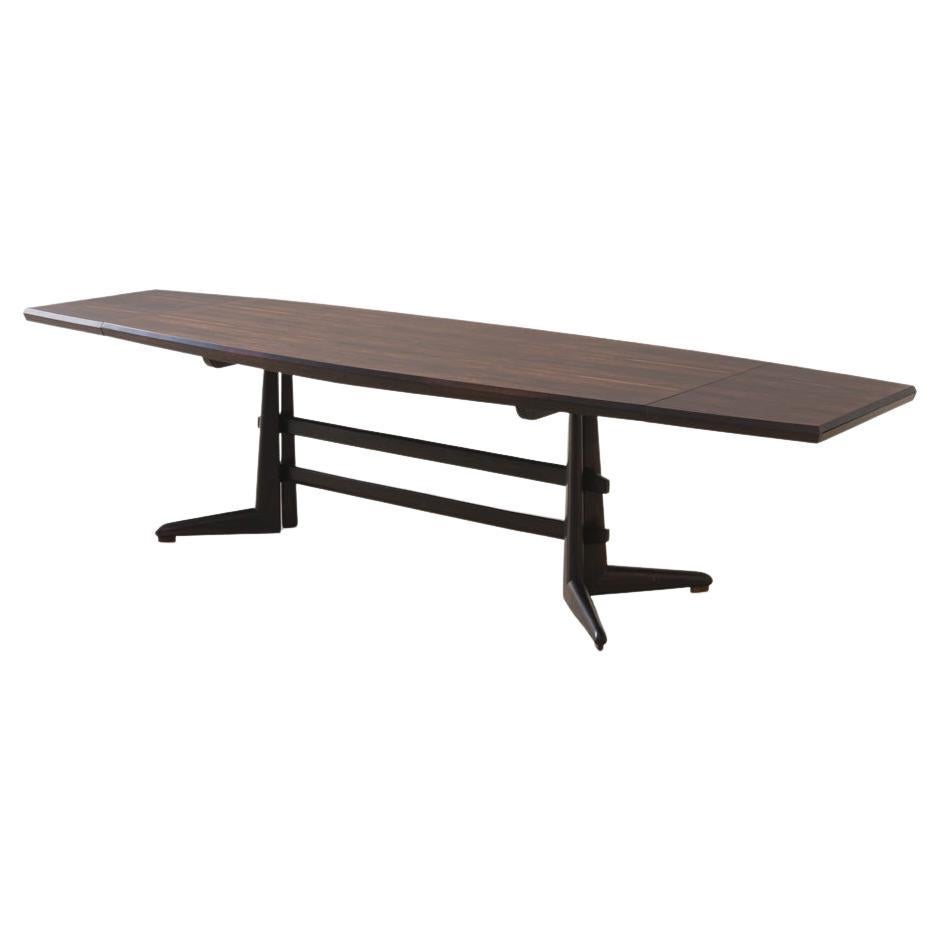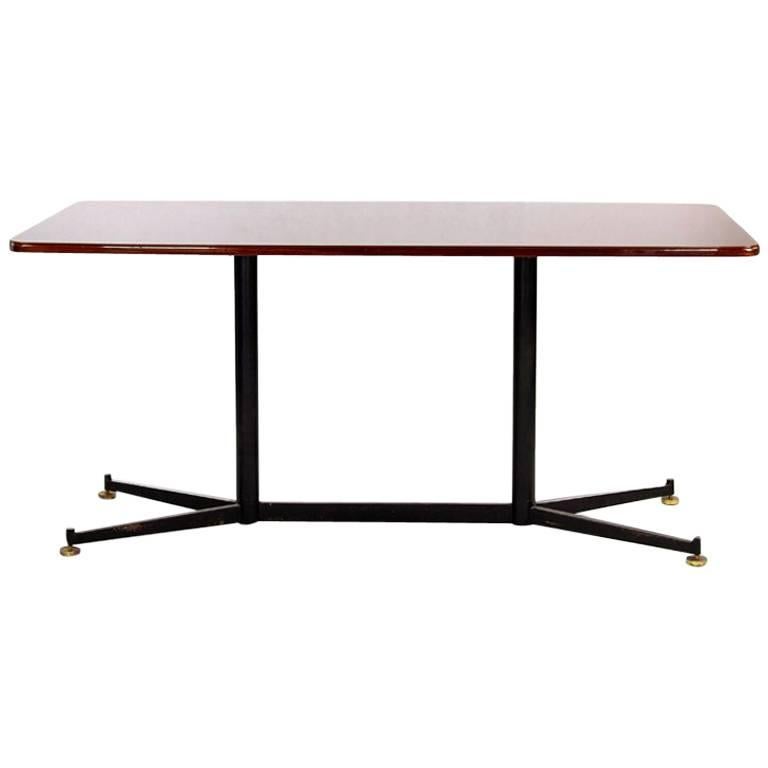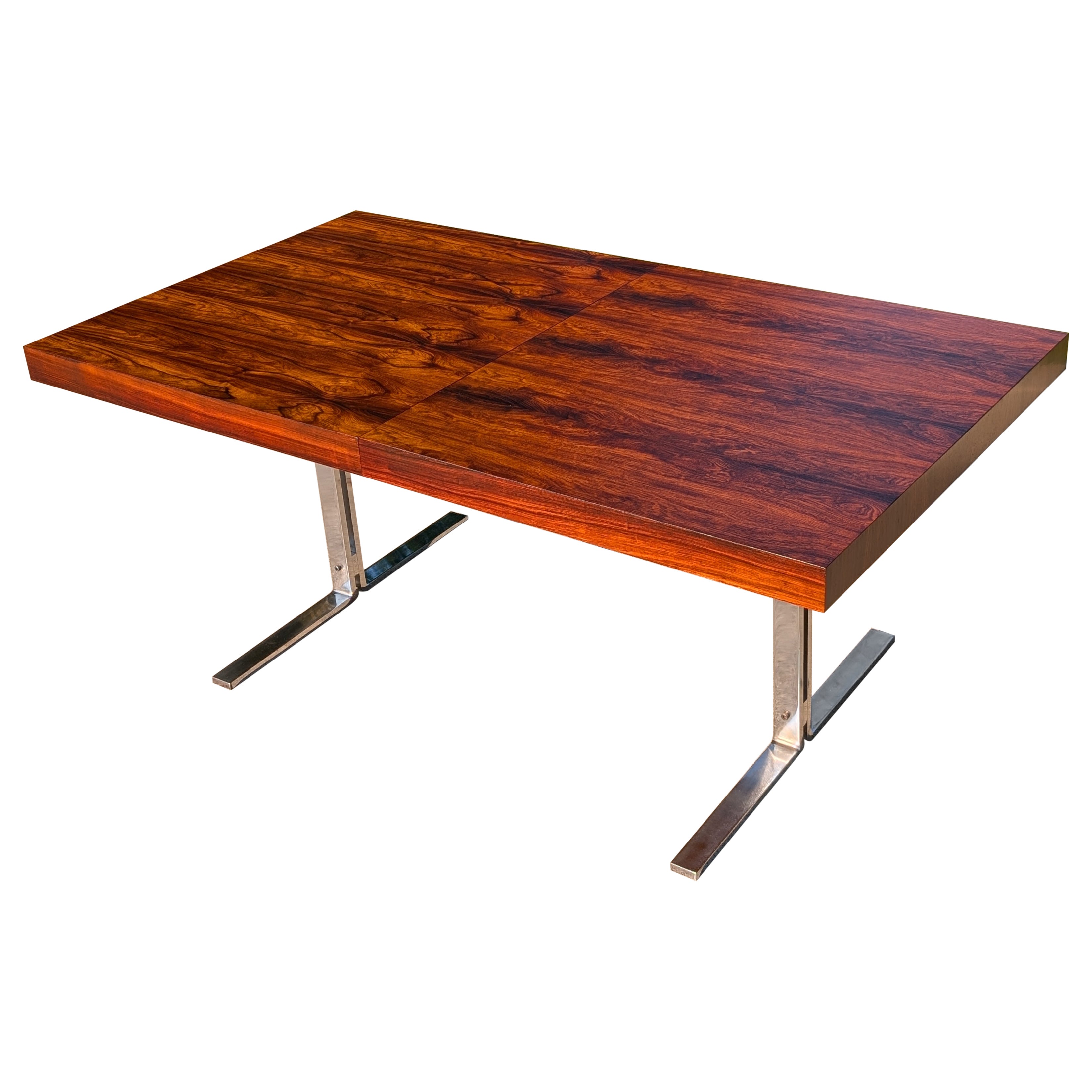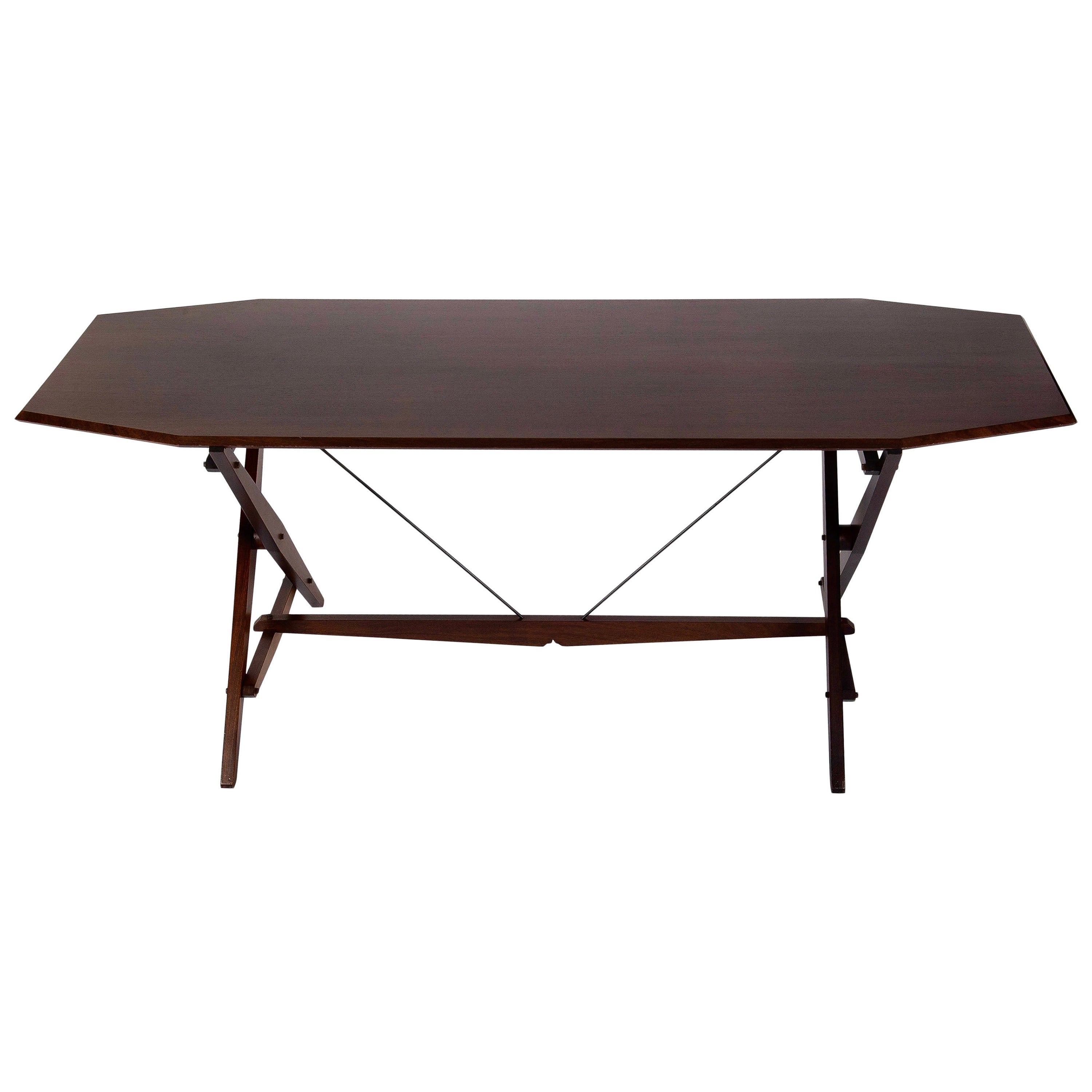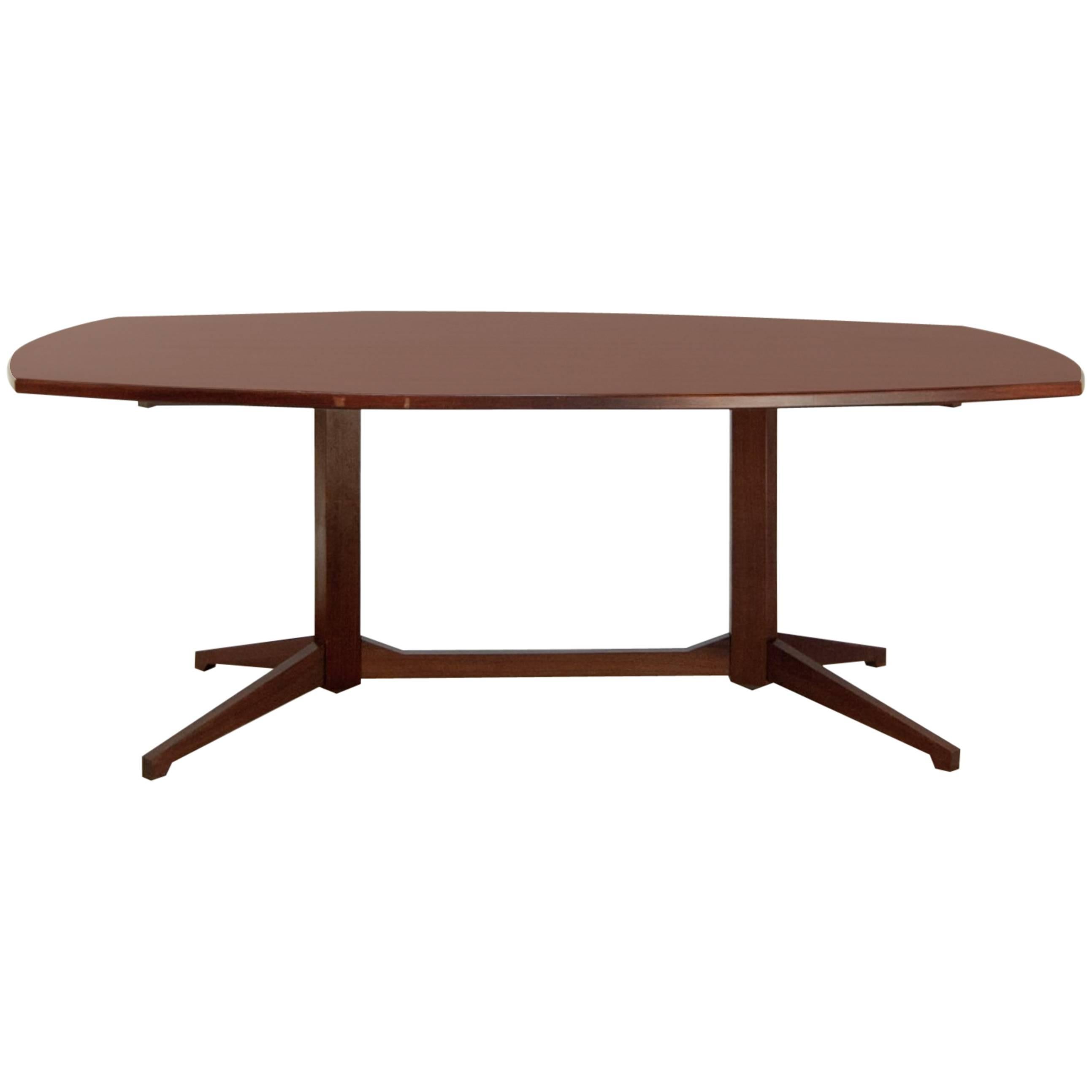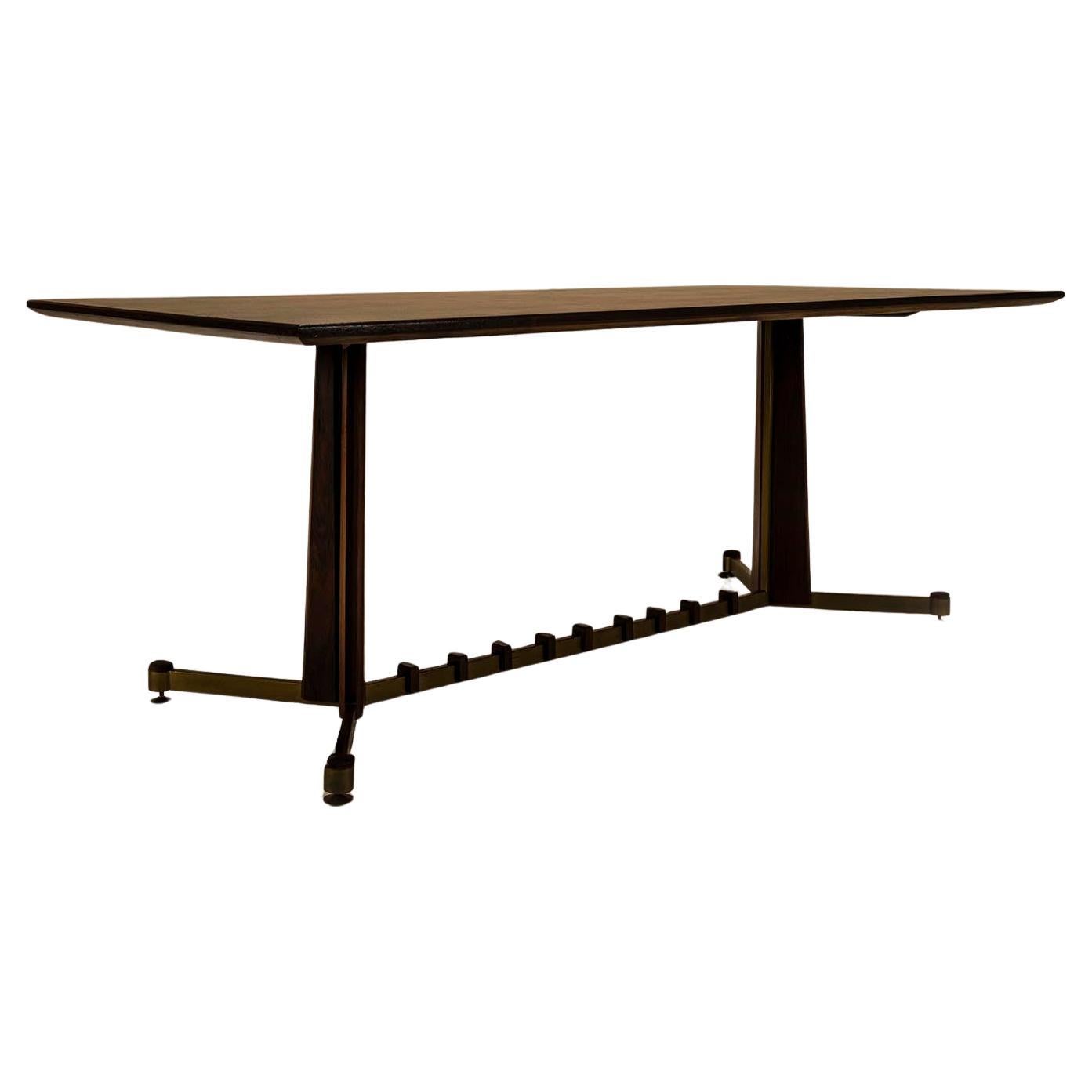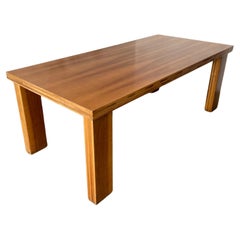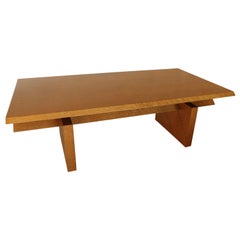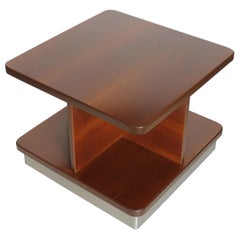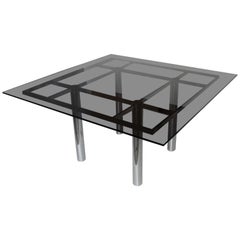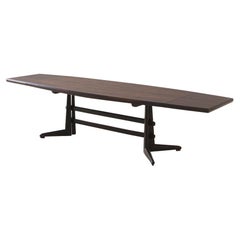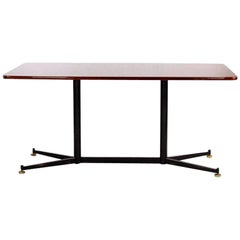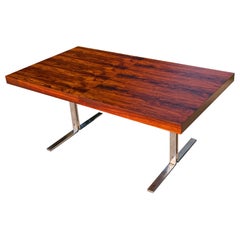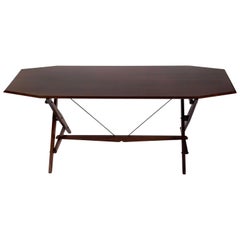Items Similar to Mid-Century Italian Formanova rosewood Table by Gianni Moscatelli, circa 1965
Want more images or videos?
Request additional images or videos from the seller
1 of 10
Mid-Century Italian Formanova rosewood Table by Gianni Moscatelli, circa 1965
$6,257.40
£4,632.69
€5,200
CA$8,663.81
A$9,458.81
CHF 4,958.87
MX$114,880.88
NOK 61,928.17
SEK 58,476.71
DKK 39,588.71
About the Item
Dinner or Conference table designed by Gianni Moscatelli for Formanova, dated circa 1965.
Big dimension, chromed metal structure and veneer rosewood top.
Formanova born from the creativity, passion of Gianni Moscatelli.
In 1959, after having graduated from the Higher Institute of Design, founded the company, creating a line of products, armchairs and chairs, furniture, desks and tables.
- Creator:Gianni Moscatelli (Designer),Formanova (Manufacturer)
- Dimensions:Height: 29.53 in (75 cm)Width: 104.34 in (265 cm)Depth: 39.38 in (100 cm)
- Style:Mid-Century Modern (Of the Period)
- Materials and Techniques:
- Place of Origin:
- Period:
- Date of Manufacture:1965
- Condition:Wear consistent with age and use. the table will be refinished without any additional cost.
- Seller Location:Sacile, IT
- Reference Number:1stDibs: LU2360310279983
About the Seller
5.0
Gold Seller
Premium sellers maintaining a 4.3+ rating and 24-hour response times
Established in 1990
1stDibs seller since 2016
163 sales on 1stDibs
Typical response time: <1 hour
- ShippingRetrieving quote...Shipping from: Sacile, Italy
- Return Policy
Authenticity Guarantee
In the unlikely event there’s an issue with an item’s authenticity, contact us within 1 year for a full refund. DetailsMoney-Back Guarantee
If your item is not as described, is damaged in transit, or does not arrive, contact us within 7 days for a full refund. Details24-Hour Cancellation
You have a 24-hour grace period in which to reconsider your purchase, with no questions asked.Vetted Professional Sellers
Our world-class sellers must adhere to strict standards for service and quality, maintaining the integrity of our listings.Price-Match Guarantee
If you find that a seller listed the same item for a lower price elsewhere, we’ll match it.Trusted Global Delivery
Our best-in-class carrier network provides specialized shipping options worldwide, including custom delivery.More From This Seller
View AllCarlo Scarpa Dining Table for Bernini, Italy, 70s
By Bernini, Carlo Scarpa
Located in Sacile, PN
Carlo Scarpa Dining Table for Bernini, Italy, 70s
This table is designed by Carlo Scarpa, a renowned Italian architect and designer. The table features a minimalist and elegant desi...
Category
Vintage 1970s Italian Mid-Century Modern Dining Room Tables
Materials
Wood
Giovanni Offredi for Saporiti Executive Desk, Italy, 1980s Maple Wood
By Saporiti, Giovanni Offredi
Located in Sacile, PN
Giovanni Offredi for Saporiti, executive desk, bird’s-eye maple, Italy, 1980s.
This postmodern pieces is sculptural and holds various striking elements. Firstly the execution of the...
Category
Vintage 1980s Italian Post-Modern Desks and Writing Tables
Materials
Birdseye Maple
Mid-Century Rosewood Italian Coffee or Sofas Table with Wheels by Formanova 70s.
By Formanova, Gianni Moscatelli
Located in Sacile, PN
Formanova 1978 rosewood coffee or sofas table with wheels.
Formanova born from the creativity, passion of Gianni Moscatelli.
In 1959, after having graduated from the Higher Insti...
Category
Vintage 1970s Italian Mid-Century Modern Coffee and Cocktail Tables
Materials
Steel
Tobia Scarpa "Andre" Square Dining Table for Gavina, 1968
By Tobia Scarpa, Gavina
Located in Sacile, PN
Andre square dining table designed by Tobia Scarpa for Gavina, dated 1968.
Smoked glass top on chrome structure.
Category
Vintage 1960s Italian Mid-Century Modern Dining Room Tables
Materials
Chrome
Maurice Barilone Rust-Brown "Neolitico" Console for Reflex, Italy 1981
By Reflex, Maurice Barilone
Located in Sacile, PN
Maurice Barilone rust-brown Neolitico Console for Reflex
The Neolitico Console generates a contemporary look. The curved rust-brown base supports a 15mm thick glass top and comple...
Category
Vintage 1980s Italian Modern Console Tables
Materials
Metal
$3,715 Sale Price
20% Off
"Orseolo" Black Table by Carlo Scarpa for Simon Gavina, Italy 70s
By Carlo Scarpa, Simon Gavina Editions
Located in Sacile, PN
Carlo Scarpa "Orseolo" black table for Simon, 1972.
Table, polyester varnished with mirror polished finish, made for the assembly of thick, elementary geometric panels with satin-fi...
Category
Vintage 1970s Italian Mid-Century Modern Dining Room Tables
Materials
Wood
You May Also Like
Rosewood Dining Table by Jean Gillon, Italma, 1960s, Brazilian Midcentury
By Italma, Jean Gillon
Located in New York, NY
This fantastic dining table was designed in the 1960s by Jean Gillon (1919-2007), a Romanian-born architect, artist, and designer who landed in Brazil in 1956. The piece has a solid Rosewood structure, with a veneered top and extensions that comfortably accommodate six to ten seats.
Gillon created an extensive and varied production of furniture, drawings, paintings, sculptures, tapestries, costumes, and scenarios for theater. In 1961, he opened his own company to manufacture furniture, Cidam, a company that came to be called WoodArt. In addition to this brand, other Brazilian furniture...
Category
Vintage 1960s Brazilian Mid-Century Modern Dining Room Tables
Materials
Rosewood
Italian Dining Rosewood Table with Black Steel Legs and Glass Top, 1950s
Located in Wolfurt, AT
This dining table was designed in Italy in the 1950s. It consists of a rosewood veneer, a frame made of black steel with brass feet and a reddish-brown glass top. The rosewood veneer...
Category
Vintage 1950s Italian Mid-Century Modern Dining Room Tables
Materials
Steel
1960s Rosewood Dining Table by Poul Norreklit for Georg Petersens
By Georg Petersens, Poul Nørreklit
Located in Cedar Falls, IA
Elevate any space with this stunning Danish Modern rosewood dining table by Poul Nørreklit for Georg Petersens, crafted in Denmark around the 1960s. This mid-century modern masterpie...
Category
Vintage 1960s Danish Mid-Century Modern Dining Room Tables
Materials
Chrome
Rare Mahogany 'TL2' Cavalletto Table / Desk by Franco Albini for Poggi, Italy
By Poggi, Franco Albini
Located in London, GB
A rare mahogany version of the Cavaletto or TL2 table designed by the great neo-rationalist designer, Franco Albini. Designed in 1950 for manufacturers Poggi...
Category
Vintage 1950s Italian Mid-Century Modern Desks and Writing Tables
Materials
Steel
Franco Albini Mahogany mid-centry Italian Table Model TL-22 produced by Poggi
By Franco Albini
Located in Barcelona, ES
Franco Albini & Franca Helg.
Dining table model no. TL22.
Manufactured by Poggi,
Italy, 1958.
Mahogany.
Measurements:
180.3 cm x 104.1 cm x 73 H cm.
70.98 in x 40.98 in x 28.74 in.
Literature:
Giuliana Gramigna, Repertorio 1950/1980, Milan, 1985, p. 123.
Franco Albini, was born in 1905 and died in 1977. He spent his childhood and part of his youth in Robbiate in Brianza, where he was born. Albini, as an adolescent moved with his family to Milan. Here he enrolled in the Faculty of Architecture of the Polytechnic and graduated in 1929. He started his professional activity in the studio of Gio Ponti and Emilio Lancia, with whom he collaborated for three years. At the 1929 International Exhibition in Barcelona (where Gio Ponti curated the Italian pavilion and Mies van der Rohe realized that of Germany) and in Paris where, as Franca Helg recounted, he had the opportunity to visit the studio by Le Corbusier.
In those three years, the works he carried out are admittedly of the twentieth century imprint. It is the meeting with Edoardo Persico that marked a clear turning point towards rationalism and the approach to the group of editors of "Casabella". The partly ironic and partly very harsh comments of the Neapolitan critic to a series of drawings, made by Albini for the design of some office furniture, caused him a great disturbance. “I spent days of real anguish - Albini recalls - I had to answer all the questions. I also had a fever, a large and long fever. "
The meted provoked Albini to openen a professional studio in via Panizza with Renato Camus and Giancarlo Palanti. The group of architects began to deal with public housing by participating in the competition for the Baracca district in San Siro in 1932 and then building the IFACP neighborhoods: Fabio Filzi (1936/38), Gabriele D'Annunzio and Ettore Ponti (1939).
During this period, Albini also worked on his first villa (Pestarini), which Giuseppe Pagano, architect and critic of the time, presented as follows: “This coherence, which the superficial rhetoric of fashionable jugglers calls intransigence, and which is instead the basis of understood between the fantasy of art and the reality of the craft, in Franco Albini, it is so rooted that it transforms theory into a moral attitude ".
But it is above all in the context of the exhibitions that the Milanese master experienced his compromise between that "rigor and poetic fantasy" of which Pagano speaks, coining the elements that became a recurring theme in his . The opening in 1933 of the new Triennale headquarters in Milan, in the Palazzo dell'Arte, was an important opportunity to express the strong innovative character of rationalist thinking, a gym in which to freely experiment with new materials and new solutions, but above all a "method". "Cultivated as a communication laboratory, the art of setting up was for the rationalists of the first generation what the perspective had been for the architects of humanism: the field open to a hypothesis of space that needed profound reflections before landing the concreteness of the construction site ".
Together with Giancarlo Palanti, Albini on the occasion of the V Triennale di Milano set up the steel structure house (with R. Camus, G. Mazzoleni, G. Minoletti and with the coordination of G. Pagano), for which he also designed the 'furniture. At the following Triennale of 1936, Persico dided, together with a group of young designers gathered by Pagano in the previous edition of 1933, Franco Albini took care of the preparations of the home exhibition. The setting up of Stanza per un uomo, at that same Triennale, allows us to understand the acute and ironic approach of Albini, as a man and as a designer: "Celebrating the beauty of mechanics was the imperative to which, for example, the surprising displays by Franco Albini who managed, in the subtle way of a refined and rarefied style, to sublimate their practical content in the metaphysics of daring still lifes: flying objects which marked in the void refined frames and metal intricacies the nodes of a fantastic cartography where industry finally became art free from purpose ".
That same year Albini and Romano designed the exhibition of the Ancient Italian Goldsmithery: vertical uprights, simple linear rods, designed the space. A theme, of the "flagpole", seemed to be the center of the evolution of production and the creative process. The concept is reworked over time, with the technique of decomposition and recomposition typical of Albinian design: in the preparation of the Scipione Exhibition and contemporary drawings (1941) the tapered flagpoles, on which the paintings and display cases were hung, are supported by a grid of steel cables; in the Vanzetti stand (1942) they take the V-shape; in the Olivetti shop in Paris (1956) the polished mahogany uprights support the shelves for the display of typewriters and calculators.
The flagpole is found, however, also in other areas. In the apartments he designed, it is used as a pivot on which the paintings can be suspended and rotated to allow different points of view, but at the same time as an element capable of dividing the spaces. The Veliero bookcase...
Category
Mid-20th Century Italian Mid-Century Modern Dining Room Tables
Materials
Mahogany
Dining Table in Mahogany, Rosewood and Brushed Brass, Italy, 1960s
Located in Hellouw, NL
Italian design from the 1960s often balanced boldness with subtle detailing. This vintage dining table is no exception. Combining sculptural lines with rich materials, it reflects a ...
Category
Vintage 1960s Italian Mid-Century Modern Dining Room Tables
Materials
Brass
More Ways To Browse
Round Conference Tables
Oval Conference Tables
Used Glass Conference Table
Black Conference Table
Glass Top Conference Tables
Office Conference Room Tables
Wooden Conference Tables
Danish Conference Table Teak
Pink Lacquer Desk
Knoll Boat Table
Used Conference Tables And Chairs
Large Round Conference Table
Used 12 Conference Table
Leather Top Conference Table
8ft Round Table
Eames Conference Table Base
Giacomo Buzzitta
Kluskens Jumbo Dining Table
